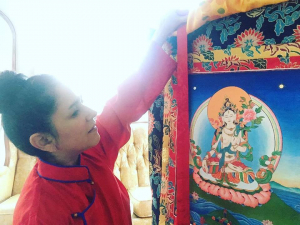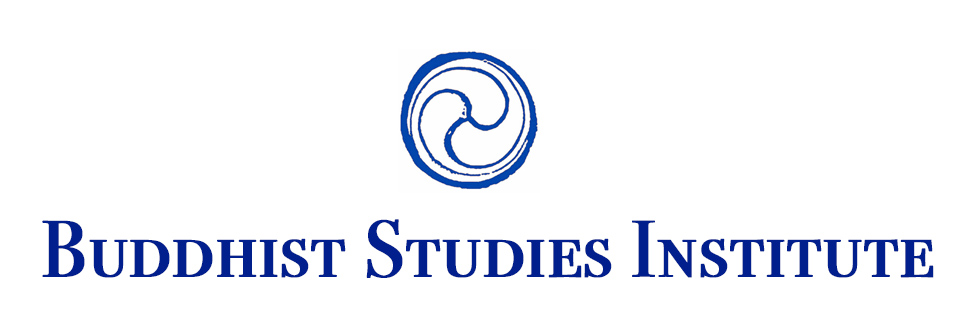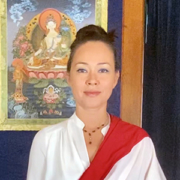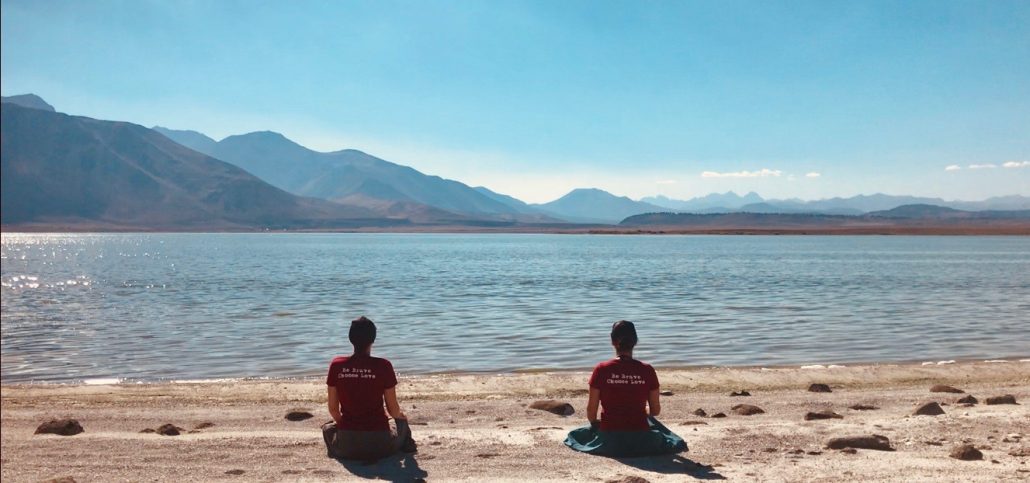For Teachers Beholding a Diverse Beautiful World
About Meditation Instructor Training
- Updated & Robust, 200 hours of In-Depth Training
- Self-Paced Curriculum & Live Classes
- Specialized Focus Training for Teachers
- Weekly Mentoring & Teaching Practicum
- Traditional Meditation + Buddhist Philosophy + Buddhist Ethics
- Completely Traditional + Completely Current
- For Teachers Facing A Diverse Tumultuous World
The Meditation Instructor Training supplies the fundamental knowledge and experience necessary to lead meditation classes and one-day meditation intensives.
This training is a pre-requisite for the Chaplaincy Certificate offered summer of 2024.
People all over the world have turned to Buddhist meditation as a source of wisdom. Meditation offers a powerful method to access a sense of spaciousness, peace and authentic presence.
The practical benefits of meditation are well documented. Research shows it improves mood, reduces stress (Brown & Warren 2003), it improves memory, visuospatial reasoning, sustained attention and executive brain function (Zeidan et al. 2010). It reduces sub-clinical depression and anxiety (Schreiner and Malcolm 2012).
From a Buddhist point of view, when we know how to meditate, we learn how to work with mind and emotions. We have a practice for unraveling conditioned scripts and unconscious habits. Meditation is a pathway to discovering human goodness by making peace with our mind. Ultimately it is a method for getting free from dissatisfaction, resolving confusion and waking up to see reality more clearly.
What our Graduates are Saying
Letter from Pema Khandro
Alot Has Changed Since the Beginning of Mindfulness
 It has been a long time since the mindfulness movement began. It was catalyzed by groundbreaking early pioneers, for example, John Kabat-Zinn’s Mindfulness Based Stress Reduction programs in the 70’s and his inspiring book, Full Catastrophe Living, which was published in 1990. So much has changed since then. This was before the internet. It was before the internet became integrated with the fabric of our lives. This was before we were talking about the impacts of orientalism and colonialism in the appropriation of Buddhist traditions. This was before we were collectively thinking through the lens of trauma and addressing the question of why it is that we don’t always feel better when we meditate. This was before we were talking about power structures in teacher-student ethics. This was before the #metoo movement in Buddhism and before the collective awakening to racial trauma. This was before we had collectively woken up to the need for racial healing and diversity skills in the meditation class. These are defining concerns that change what the meditation teacher of the future is. It is why I developed the Meditation Instructor Training, with a deep wish to empower meditation teachers to meet the urgent and pressing contexts of our time.
It has been a long time since the mindfulness movement began. It was catalyzed by groundbreaking early pioneers, for example, John Kabat-Zinn’s Mindfulness Based Stress Reduction programs in the 70’s and his inspiring book, Full Catastrophe Living, which was published in 1990. So much has changed since then. This was before the internet. It was before the internet became integrated with the fabric of our lives. This was before we were talking about the impacts of orientalism and colonialism in the appropriation of Buddhist traditions. This was before we were collectively thinking through the lens of trauma and addressing the question of why it is that we don’t always feel better when we meditate. This was before we were talking about power structures in teacher-student ethics. This was before the #metoo movement in Buddhism and before the collective awakening to racial trauma. This was before we had collectively woken up to the need for racial healing and diversity skills in the meditation class. These are defining concerns that change what the meditation teacher of the future is. It is why I developed the Meditation Instructor Training, with a deep wish to empower meditation teachers to meet the urgent and pressing contexts of our time.
Meditation for Troubled Times
Some things do remain the same since the beginning of the mindfulness movement. The persistent suffering, the emotional dysregulation that dominates a life, and the sense of disembodiment and alienation that can overshadow a life. The power of meditation to stabilize and heal the body and mind is only more and more evident due to so much research. It is clear to me that, perhaps more than ever, there is a great need for meditation instructors who can serve as a soothing balm in these troubled times. But there are all these new questions that must be cared for in the training of new meditation instructors, or they will be ill equipped and underprepared for the great challenges that await.
Meditation with Philosophy & Ethics Intact
I originally initiated the Meditation Instructor Training with the intention in mind that Buddhist philosophy and ethics should be kept intact with meditation. As a scholar of Buddhist philosophy, I have long been impressed at how often people who were exposed to mindfulness training also longed to experience the fuller context of Buddhist philosophy and ethics. The curiosity and appetite for that knowledge is unending and I reimagined the training of the meditation instructor to return to that source material. Going beyond the artificial and ethnocentric construct of a secular/religious binary, imperative questions about the context of meditation loom large for meditators. What is meditation for? What is mind? How do we work with emotions? How is our consciousness conditioned by our values and actions? What is the point of meditation? How do the obstacles to meditation relate to our identity, to our body and to our society? These are just a few of the issues that Buddhist philosophy and ethics weigh in on and why I felt that they must be taught in tact with the meditation methods that were shaped by these very concerns.
Our Faculty
When Satya and Aruna joined me as co-teachers of the MIT, we developed the teaching into an online format to make it more accessible to people with full and demanding lives. I felt like we were standing together to face the challenge of nurturing and supporting the meditation instructors of the future. And that commitment has been expressed thoroughly in our new expanded training format.
Meditation Teachers of the Future
Now as we are poised to begin our next cohort of training, I am also proud to celebrate that our training addresses those invisible yet overwhelming factors that sit alongside us on the meditation cushion. We are always doing meditation practice in the context of power, sexuality, race, trauma and technology. This is not just a training in techniques, but instead in the robust array of traditional Buddhist meditation practices in tact with philosophy and ethics along with a deep care for how meditation teaching and practice intersects with issues of power, sexuality, race, trauma and technology. We are training the meditation teachers of the future.
New Beginnings
The new beginning of this program is good news in a time when it is so easy to be overwhelmed by all the stories of suffering and sorrow that appear in our news feeds everyday. I draw encouragement and relief from this beautiful project of creating empowered meditation instructors. It gives me great relief to know that they will be leaders that bring compassion, care and wisdom to a world that so sorely needs it and to know that they will be prepared and ready to meet the turbulent times ahead.
With joy,

Meditation Teachers Needed
Equanimity, calm, peace, inner strength, resilience, centeredness… there are so many reasons the world needs meditation teachers.
Meditation Teachers can offer important tools for relating to these tumultuous times.
Meditation promotes mindfulness and equanimity – the ability to let emotional states arise and pass without becoming overwhelming. With mindfulness, we are able to become aware of our mind-states, rather than carried away by them. It promotes the state of equanimity, the ability to respond skillfully to situations. Instead of responding with knee-jerk reactions, blame, resentment and anger we can choose healthier responses, such as loving-kindness and compassion.
There are so many places where meditation can be taught. It can add a profound benefit to temples, yoga centers, health centers, schools, corporations, communities and healthcare settings. This training offers meditation instructors copious knowledge, both practical and experiential – so that you can offer high-quality classes in any setting.
About the Teachers
Pema Khandro
The course curriculum is designed and led by Tulku Pema Khandro, Ph.D., internationally renowned teacher and scholar of Buddhist philosophy. Pema Khandro has a bachelor’s degree in Sociology, a Master’s degree specializing in Tibetan buddhism, and a Ph.D. in Buddhist Studies. Her scholarly research focuses on the intellectual history of Buddhist meditation in Tibet, the history of Dzogchen and on gender studies. She is the founder of Ngakpa International and its three projects, The Buddhist Studies Institute, Dakini Mountain and the Yogic Medicine Institute. In her work as a Buddhist teacher she is an authorized Lama and lineage holder of the Nyingma and Kagyu traditions and was enthroned to carry on the lineage of her predecessor, the first Pema Khandro, a twentieth century yogini in Eastern Tibet. She is certified in two systems of natural medicine, Ayurveda and Tibetan medicine as well as three times certified as an Advanced Yoga teacher, and she has led dozens of courses in nutrition, meditation teacher trainings, yoga teacher trainings and natural medicine courses for health workers from every field. In her humanitarian work she has supported children, orphans and elders in the Himalayas. She has led a vibrant world-wide community since 1999. Through the Buddhist Studies Institute, she also offers a complete curriculum of training in Tibetan meditation and Buddhist Philosophy.
Course Details
About the Format
The training includes a study of the postures for meditation, breathing techniques, the five key meditation techniques from Zhine, (also known “Calm Abiding), common obstacles to meditation, remedies for obstacles of meditation and more. We will also review the most important Buddhist teachings to support meditation practice – looking to the wealth of Buddhist philosophy for new perspectives on what is mind, how to work with thoughts and emotions, what is the body-mind connection and how body and mind can be harnessed for awakening.
OVERVIEW OF KEY ASPECTS
Orientation & Introduction – Live Online
- Welcome
- How the Course works, Practical Overview and Questions
- Meeting with each of the participants
- Why Meditation Training? Why Online?
- What is Mind? A Buddhist Point of View
- Expectations
- Q&A
Lessons & Practice Videos
- Study the crucial points of meditation practice from home, at your own pace.
- You will receive new video lessons each week covering the essential points of Meditation practice and Meditation Instruction.
Exams
- Students will complete online quizzes reviewing the major principles of the video lessons they have received.
- During the course there will be three exams online, and students will complete a final cumulative exam online in order to progress to the teaching practicum.
Daily Journal Students will be required to submit online journal entries documenting daily practice (done alongsdie our video lessons or with the daily meditation online live program). Students are expected to maintain a daily meditation practice of at least 24 minutes per day throughout the entirety of the course. Journal questions include:
- What time you started practicing, what time you finished practicing
- What were the positive things about your practice today?
- Name one challenge about your practice today?
- Where did you practice?
- Which practice did you complete today?
Workshops – Live Online Weekly Focus Groups
- Students will meet with the instructors for online workshops, discussion, and evaluation. During the workshops, students will have opportunities to lead meditation and receive feedback from the instructors.
- Students will also meet with a study-buddy once a week for 30 minutes to practice leading meditation and document meetings in an online journal.
Teaching Practicum
- Each student will lead 6 hours of meditation classes to friends and family, and submit review forms.
- Once confirmed by instructors, each student will lead 6 hours of meditation classes in a local community setting. It is the student’s responsibility to organize and arrange these classes within their local community.
- Students must also lead 6 classes in the Daily Meditation Online format, and submit review forms.
Final Transmission & Graduation – Live Online
- Students who complete all aspects of the training will be invited to the final transmission class and graduation.
Detailed Course Schedule
Welcome to Meditation Instructor Training!
3 Modules – All times are listed in Pacific Time
Below is the Detailed Course Schedule for your reference.
Prerequisites
- Self-Paced Videos: Introduction to Buddhist Meditation (4 hours) & What is Mind (53 min)
- All requirements set forth in the Application, including consistency of conduct
MODULE 1: Traditional Meditation – Feb 19 – March 18
- Live Orientation – February 19
- Learning to Teach (Videos about Meditation) – Weeks 1, 2, & 3
- Teachings on Karma – Week 3
- Excellent Path: Bodhisattva’s Way and Contemporary/Scientific Approaches to Meditation (New!) – Week 4
Week 1: 11 hours
Live Orientation – February 19th 1-2 pm (one hour)
7 Learning to Teach Videos (201 min) + quizzes (70 min) + exam (30 min): 5 hours
- Lesson 1 – How to sit – 22 min
- Lesson 2 – Why meditate – 34 min
- Lesson 3 – Tradition and the context of practice – 29 min
- Lesson 4 – Ideal place & time – 32 min
- Lesson 5 – Mastering the posture – 24 min
- Lesson 6 – Intro to Preliminary Somatic Practices – 29 min
- Lesson 7 – Calm abiding 1 – 31 min
- MIT Exam 1 on lessons 1 – 7 released
Daily Meditation Practice (with videos or live with Daily Meditation Online) + journal: 30 minutes/day (3.5 hours)
Accountability Phone Calls + journal: 30 minutes
February 26th – Monday Weekly Class Meeting and Practice: 1-2 pm
- Discuss Lessons 1-7
- Practice Drills -Introductions (30 second and 2 min)
- Come prepared to be drilled in focus group & get feedback
- Do Practice Drills – with accountability partner during week
- Introduction (Bio and the Lineage)
Week 2: 10 hours
7 Learning to Teach Videos (233 min) + quizzes (70 min) = 5 hours
- Lesson 8 – Calm abiding 2 – 39 min
- Lesson 9 – Calm abiding 3 – 30 min
- Lesson 10 – Calm abiding 4 – 32 min
- Lesson 11 – Calm abiding 5 – 33 min
- Lesson 12 – Obstacles & antidotes 1 – 34 min
- Lesson 13 – Obstacles & antidotes 2 – 38 min
- Lesson 14 – Obstacles & antidotes 3 – 27 min
Daily Meditation Practice (with videos or live with Daily Meditation Online) + journal: 30 minutes/day (3.5 hours)
Accountability Phone Calls + journal: 30 minutes/week
March 4th – Monday Weekly Class Meeting and Practice: 1-2 pm
- Discuss Lessons 7-11
- Practice Drills – Refuge & Bodhichitta (secular & buddhist)
- Come prepared to be drilled in focus group & get feedback
- Do Practice Drills – with accountability partner during week
- Introduction (Bio and the Lineage)
- Refuge & Bodhichitta (Buddhist or Secular)
Week 3: 10 hours
2 Learning to Teach Videos (65 min) + quizzes (20 min) + Exam 2 (30 min), Teachings on Karma Videos (184 min) = 5 hours
- Lesson 14 – Obstacles & antidotes 3 – 27 min
- Lesson 15 – Obstacles & antidotes in diet & lifestyle – 38 min
- MIT Exam 2 on lessons 8-15 released
- Teachings on Karma:
- 2023 Live Recording – Teachings on Karma – 31 min
- Introduction – 12 min
- Four Types and Four Factors of Karma – 12 min
- Good Karma / Bad Karma – 25 min
- Changing Your Karma – Impulses – 17 min
- Changing Karma – Motivation – 20 min
- Purification Part 1 – 20 min
- Purification Part 2 – 24 min
- Dedicating Merit – 5 min
- Who We Really Are – 18 min
Daily Meditation Practice (with videos or live with Daily Meditation Online) + journal: 30 minutes/day (3.5 hours)
Accountability Phone Calls + journal: 30 minutes/week
March 11th – Monday Weekly Class Meeting and Practice: 1-2 pm
- Discuss Lessons 12-15 and the Teachings on Karma
- Practice Drills – 7 Point Posture
- Come prepared to be drilled in focus group & get feedback
- Do Practice Drills – with accountability partner during week
- Introduction (Bio and the Lineage)
- Refuge & Bodhichitta (Buddhist or Secular)
- 7 Point Posture
Week 4: 10 hours
4 Excellent Path: Bodhisattva’s Way Videos (104 min) and Contemporary/Scientific Approaches to Meditation (180 min) = 5 hours
- The Path and Benefits (30 min)
- Contemplating Bodhichitta (22 min)
- Exchanging Self and Others (28 min)
- Meditation: How to See Others (26 min)
Daily Meditation Practice (with videos or live with Daily Meditation Online) + journal: 30 minutes/day (3.5 hours)
Accountability Phone Calls + journal: 30 minutes/week
Weekly Class Meeting and Practice: 1 hour
March 18th – Monday Weekly Class Meeting and Practice: 1-2 pm
- Discuss Excellent Path and Contemporary/Scientific Approaches to Meditation
- Practice Drills – Warm-up / Somatic Practices
- Come prepared to be drilled in focus group & get feedback
- Do Practice Drills – with accountability partner during week
- Introduction (Bio and the Lineage)
- Refuge & Bodhichitta (Buddhist or Secular)
- 7 Point Posture
- Somatic Practice
MODULE 2 – Teaching Practicum – March 25th- May 27th
- Completing Learning to Teach Material, Manuals, and Final Exam – Weeks 5, 6, & 7
- Friends and Family Practicum – Weeks 8 & 9
- Community Practicum – Weeks 10 & 11
- Teaching with the Daily Meditation Online Program – Weeks 12 & 13
- Final Practicum – Week 14
Week 5: 10 hours
Learning to Teach Videos (186) + Quizzes (50 min) Exam (30 min) = 4.5 hours
- Tips for Teaching – 26 min
- Stages of meditation – 28 min
- Goal of Practice – 27 min
- Questions & Answers – 28 min
- Instructor parameters – 54 min
- Bonus lesson – 23 min
- MIT Exam 3 on lessons 15 – 21 and the bonus lesson released
Daily Meditation Practice (with videos or live with Daily Meditation Online) + journal: 30 minutes/day (3.5 hours)
Accountability Phone Calls + journal: 30 minutes/week
March 25th – Monday Weekly Class Meeting and Practice: 1-2 pm
- Discuss Learning to Teach Videos
- Practice Drills – 21 Breaths
- Come prepared to be drilled in focus group & get feedback
- Do Practice Drills – with accountability partner during week
- Introduction (Bio and the Lineage)
- Refuge & Bodhichitta (Buddhist or Secular)
- 7 Point Posture
- Somatic Practice
- 21 Breaths
Week 6: 7.5 hours
Read the Meditation Instructor Manual (1.5 hours)
Take the Final Exam (1 hour)
Daily Meditation Practice (with videos or live with Daily Meditation Online) + journal: 30 minutes/day (3.5 hours)
Accountability Phone Calls + journal: 30 minutes/week
April 1st – Monday Weekly Class Meeting and Practice: 1-2 pm
- Practice Drills – Om, Ah, Hung
- Come prepared to be drilled in focus group & get feedback
- Do Practice Drills – with accountability partner during week
- Introduction (Bio and the Lineage)
- Refuge & Bodhichitta (Buddhist or Secular)
- 7 Point Posture
- Somatic Practice
- 21 Breaths
- Om, Ah, Hung
Week 7: 5.5 hours
Read and practice with the Half Hour Meditation Class Guide (30 min)
Daily Meditation Practice (with videos or live with Daily Meditation Online) + journal: 30 minutes/day (3.5 hours)
Accountability Phone Calls + journal: 30 minutes/week
April 8th – Monday Weekly Class Meeting and Practice: 1-2 pm
- Practice Drills – Thinking
- Come prepared to be drilled in focus group & get feedback
- Do Practice Drills – with accountability partner during week
- Introduction (Bio and the Lineage)
- Refuge & Bodhichitta (Buddhist or Secular)
- 7 Point Posture
- Somatic Practice
- 21 Breaths
- Om, Ah, Hung
- Thinking
Week 8: 8 hours
Begin teaching to Friends and Family Practicum – 3 hours
- Student-Teaching to Family & Friends
- Each student will lead 6 (total) hours of meditation classes to friends and family, and submit review forms.
Daily Meditation Practice (with videos or live with Daily Meditation Online) + journal: 30 minutes/day (3.5 hours)
Accountability Phone Calls + journal: 30 minutes/week
April 15th – Monday Weekly Class Meeting and Practice: 1-2 pm
- Practice Drills – Forced Zhine
- Come prepared to be drilled in focus group & get feedback
- Do Practice Drills – with accountability partner during week
- Introduction (Bio and the Lineage)
- Refuge & Bodhichitta (Buddhist or Secular)
- 7 Point Posture
- Somatic Practice
- 21 Breaths
- Om, Ah, Hung
- Thinking
- Forced Zhine
Week 9: 8.5 hours
Continue teaching to Friends and Family Practicum – 3 hours
- Student-Teaching to Family & Friends
- Each student will lead 6 (total) hours of meditation classes to friends and family, and submit review forms.
* Upon completion of Friends and Family Practicum students will schedule an evaluation with a teaching assistant or complete an evaluation during class. Once confirmed, each student will lead 6 hours of meditation classes in a local community setting. It is the student’s responsibility to organize and arrange these classes within their local community. (TA Evaluation: 30 min)
Daily Meditation Practice (with videos or live with Daily Meditation Online) + journal: 30 minutes/day (3.5 hours)
Accountability Phone Calls + journal: 30 minutes/week
April 22nd – Monday Weekly Class Meeting and Practice: 1-2 pm
- Practice Drills – Formless Meditation
- Come prepared to be drilled in focus group & get feedback
- Do Practice Drills – with accountability partner during week
- Introduction (Bio and the Lineage)
- Refuge & Bodhichitta (Buddhist or Secular)
- 7 Point Posture
- Somatic Practice
- 21 Breaths
- Om, Ah, Hung
- Thinking
- Forced Zhine
- Formless
Week 10: 8 hours
Begin Teaching in Community – 3 hours
- Student-Teaching to Community
- Each student will lead 6 (total) hours of meditation classes in a local community setting. It is the student’s responsibility to organize and arrange these classes within their local community and submit review forms.
Daily Meditation Practice (with videos or live with Daily Meditation Online) + journal: 30 minutes/day (3.5 hours)
Accountability Phone Calls + journal: 30 minutes/week
April 29th – Monday Weekly Class Meeting and Practice: 1-2 pm
- Practice Drills – Closing the Practice (Somatic and Dedication)
- Come prepared to be drilled in focus group & get feedback
- Do Practice Drills – with accountability partner during week
- Introduction (Bio and the Lineage)
- Refuge & Bodhichitta (Buddhist or Secular)
- 7 Point Posture
- Somatic Practice
- 21 Breaths
- Om, Ah, Hung
- Thinking
- Forced Zhine
- Formless
- Closing the Practice (Somatic and Dedication)
Week 11: 8 hours
Continue Teaching in Community – 3 hours
- Student-Teaching to Community
- Each student will lead 6 (total) hours of meditation classes in a local community setting. It is the student’s responsibility to organize and arrange these classes within their local community and submit review forms.
Daily Meditation Practice (with videos or live with Daily Meditation Online) + journal: 30 minutes/day (3.5 hours)
Accountability Phone Calls + journal: 30 minutes/week
May 6th – Monday Weekly Class Meeting and Practice: 1-2 pm
- Practice Drills – The 30 Minute Meditation Guide
- Come prepared to be drilled in focus group & get feedback
- Do Practice Drills – with accountability partner during week
- Introduction (Bio and the Lineage)
- Refuge & Bodhichitta (Buddhist or Secular)
- 7 Point Posture
- Somatic Practice
- 21 Breaths
- Om, Ah, Hung
- Thinking
- Forced Zhine
- Formless
- Closing the Practice (Somatic and Dedication)
Week 12: 8 hours
Begin Teaching with the Daily Meditation Online Program – 3 hours
- Student-Teaching to Daily Meditation Online Program
- Each student will lead 6 (total) classes of meditation classes in the Daily Meditation Online Program and submit review forms.
Daily Meditation Practice (with videos or live with Daily Meditation Online) + journal: 30 minutes/day (3.5 hours)
Accountability Phone Calls + journal: 30 minutes/week
May 13th – Monday Weekly Class Meeting and Practice: 1-2 pm
- Practice Drills – The 30 Minute Meditation Guide
- Come prepared to be drilled in focus group & get feedback
- Do Practice Drills – with accountability partner during week
- Introduction (Bio and the Lineage)
- Refuge & Bodhichitta (Buddhist or Secular)
- 7 Point Posture
- Somatic Practice
- 21 Breaths
- Om, Ah, Hung
- Thinking
- Forced Zhine
- Formless
- Closing the Practice (Somatic and Dedication)
Week 13: 8 hours
Continue Teaching with the Daily Meditation Online Program – 3 hours
- Student-Teaching to Daily Meditation Online Program
- Each student will lead 6 (total) classes of meditation classes in the Daily Meditation Online Program and submit review forms.
Daily Meditation Practice (with videos or live with Daily Meditation Online) + journal: 30 minutes/day (3.5 hours)
Accountability Phone Calls + journal: 30 minutes/week
May 20th – Monday Weekly Class Meeting and Practice: 1-2 pm
- Practice Drills – Final Practicum (Full Practice)
- Come prepared to be drilled in focus group & get feedback
- Do Practice Drills – with accountability partner during week
- Introduction (Bio and the Lineage)
- Refuge & Bodhichitta (Buddhist or Secular)
- 7 Point Posture
- Somatic Practice
- 21 Breaths
- Om, Ah, Hung
- Thinking
- Forced Zhine
- Formless
- Closing the Practice (Somatic and Dedication)
Week 14: 5 hours
Daily Meditation Practice (with videos or live with Daily Meditation Online) + journal: 30 minutes/day (3.5 hours)
Accountability Phone Calls + journal: 30 minutes/week
May 27th – NO CLASS – HOLIDAY
- Do Practice Drills – with accountability partner during week
- Introduction (Bio and the Lineage)
- Refuge & Bodhichitta (Buddhist or Secular)
- 7 Point Posture
- Somatic Practice
- 21 Breaths
- Om, Ah, Hung
- Thinking
- Forced Zhine
- Formless
- Closing the Practice (Somatic and Dedication)
MODULE 3 – Teaching Ethics – June 3 – July 29th
- Teaching Ethics – Weeks 15 & 16
- Trauma Informed Meditation – Weeks 17 & 18
- Teaching in a Multicultural World – Weeks 19 & 20
- Healthy Boundaries for Teachers – Weeks 21 & 22
Week 15: 8.5 hours
Teaching Ethics – 6 Buddhist Ethics Videos (200 min)
- Buddhist Ethics Live Intro with Pema Khandro – 26 min
- Buddhist Ethics 1 – Introduction to Vows and Codes – 30 min
- Buddhist Ethics 2 – Introduction to the 5 Precepts – 51 min
- Buddhist Ethics 3 – Introduction to the Precept of Non-harming – 18 min
- Buddhist Ethics 4 – Introduction to the Precept of Not Taking What is Not Freely Given – 75 min
Daily Meditation Practice (with videos or live with Daily Meditation Online) + journal: 30 minutes/day (3.5 hours)
Accountability Phone Calls + journal: 30 minutes/week
June 3rd – Monday Weekly Class Meeting and Practice: 1-2 pm
- Discuss Buddhist Ethics Lessons
- Continue Final Practicums
- Do Practice Drills – with accountability partner during week
- Full Practice
Week 16: 8.5 hours
Teaching Ethics – 5 Buddhist Ethics Videos (196 min)
- Buddhist Ethics 5 -Sexual Misconduct – 51 min
- Buddhist Ethics 6 – The Lying Mahasiddha – 5 min
- Buddhist Ethics 7 – Vow of Speech – Speech with Integrity – 59 min
- Buddhist Ethics 8 – Precept of Speech – Further Commentary – 27 min
- Buddhist Ethics 9 – Precept Against Intoxicants – 41 min
- Buddhist Ethics 10: A Review – Underlying Principles of Behind Buddhist Ethics – 13 min
Daily Meditation Practice (with videos or live with Daily Meditation Online) + journal: 30 minutes//day (3.5 hours)
Accountability Phone Calls + journal: 30 minutes/week
June 10th – Monday Weekly Class Meeting and Practice: 1-2 pm
- Discuss Buddhist Ethics Lessons
- Continue Final Practicums
- Do Practice Drills – with accountability partner during week
- Full Practice
Week 17: 12 hours
Teaching Trauma Informed Meditation –
2 Trauma-Informed Meditation Instruction Videos (3 hours)
Book Reading (4 hours (8 total) – Trauma-Sensitive Mindfulness: Practices for Safe and Transformative Healing by David A. Treleaven
- Trauma Informed Meditation with PKR – 28 min
- Trauma Informed Meditation Instruction – 2 hours and 30 min
Daily Meditation Practice (with videos or live with Daily Meditation Online) + journal: 30 minutes//day (3.5 hours)
Accountability Phone Calls + journal: 30 minutes/week
June 17th – Monday Weekly Class Meeting and Practice: 1-2 pm
- Discuss Teaching Trauma Informed Meditation
- Continue Final Practicums (if needed)
- Do Practice Drills – with accountability partner during week
- Full Practice
Week 18: 12 hours
Teaching Trauma Informed Meditation –
3 Trauma-Informed Meditation Instruction Videos (3 hours), Book Quiz (15 min)
Book Reading (4 hours (8 total) – Trauma-Sensitive Mindfulness: Practices for Safe and Transformative Healing by David A. Treleaven
- Walking Meditation – 9 min
- Buddhism and Trauma Series: Conversation with Dr. Sarah Lewis and Pema Khandro Rinpoche – 1 hr 10 min
- Buddhism and Trauma Series: Conversation with Jim Hopper, Dr. Elizabeth Call and Pema Khandro Rinpoche – 1 hr and 23 min
Daily Meditation Practice (with videos or live with Daily Meditation Online) + journal: 30 minutes//day (3.5 hours)
Accountability Phone Calls + journal: 30 minutes/week
June 24th – Monday Weekly Class Meeting and Practice: 1-2 pm
- Discuss Teaching Trauma Informed Meditation
- Continue Final Practicums (if needed)
- Do Practice Drills – with accountability partner during week
- Full Practice
Week 19: 8 hours
Teaching Meditation in a Multicultural World
Teaching in a Multicultural World Video – 55 min
Book reading 2 hours (5.5 total hours) – Me and White Supremacy: Combat Racism, Change the World, and Become a Good Ancestor by Layla F. Saad
Daily Meditation Practice (with videos or live with Daily Meditation Online) + journal: 30 minutes//day (3.5 hours)
Accountability Phone Calls + journal: 30 minutes/week
July 1st – Monday Weekly Class Meeting and Practice: 1-2 pm
- Discuss Teaching Meditation in a Multicultural World
- Do Practice Drills – with accountability partner during week
- Full Practice
Week 20 : 8 hours and 45 min
Teaching Meditation in a Multicultural World
Book reading 3.5 hours (5.5 total hours) – Me and White Supremacy: Combat Racism, Change the World, and Become a Good Ancestor by Layla F. Saad
- Book Quiz (15 min)
Daily Meditation Practice (with videos or live with Daily Meditation Online) + journal: 30 minutes/day (3.5 hours)
Accountability Phone Calls + journal: 30 minutes/week
July 8th – Monday Weekly Class Meeting and Practice: 1-2 pm
- Discuss Teaching Meditation in a Multicultural World
- Do Practice Drills – with accountability partner during week
- Full Practice
Week 21: 11 hours and 15 min
Healthy Boundaries for Teachers
Mindfulness of Power in Teaching Meditation Video – 3 hours + Video Quiz (15 min)
Book reading 3 hours (8 total hours) The Right Use of Power: The Heart of Ethics – A Guide and Resource for Professional Relationships by Dr. Cedar Barstow
Daily Meditation Practice (with videos or live with Daily Meditation Online) + journal: 30 minutes/day (3.5 hours)
Accountability Phone Calls + journal: 30 minutes/week
July 15th – Monday Weekly Class Meeting and Practice: 1-2 pm
- Discuss Healthy Boundaries for Teachers
- Do Practice Drills – with accountability partner during week
- Full Practice
Week 22: 10 hours and 15 min
Healthy Boundaries for Teachers
Book reading 5 hours (8 total hours) The Right Use of Power: The Heart of Ethics – A Guide and Resource for Professional Relationships by Dr. Cedar Barstow
- Book Quiz (15 min)
Daily Meditation Practice (with videos or live with Daily Meditation Online) + journal: 30 minutes/day (3.5 hours)
Accountability Phone Calls + journal: 30 minutes/week
July 22nd – Monday Weekly Class Meeting and Practice: 1-2 pm
- Discuss Healthy Boundaries for Teachers
- Do Practice Drills – with accountability partner during week
- Full Practice
July 29th – Monday Weekly Class Meeting and Practice: 1-2 pm
August 5th – Monday Weekly Class Meeting and Practice: 1-2 pm
August 9, 2024 – Final Transmission, Teaching Vows and Graduation – 5-7 pm
- Live Online -Students receive the final transmission from Pema Khandro, take teaching vows, graduate and receive certification.
GROUP WORKSHOPS or OPTIONAL PRIVATE COACHING
Weekly meetings with instructors and longer group workshops are required for certification. If you must miss one or more meetings due to schedule conflicts, timezone, professional or family life, you may watch the recording of the meeting and complete homework to make up for the missed meeting. Up to 50% of the meetings may be made up in this way. If more than 50% must be missed, you may elect to receive private coaching. For every 2 hours missed, you may schedule 1 hour of private coaching from MIT faculty at the rate of $100 per session to make it up. Scheduling is based on the availability of the training instructors.
Learning to Teach Overview
Learning to Teach Overview
Introduction Lesson Zero: What is Mind?
- Taught by Pema Khandro
- What is Mind According to Buddhist Thought
- Understanding the factors of perception, experience, unconscious and identity
- How the ten factors of mind take place
- How does meditation work with the factors of mind?
- Tibetan Yoga – Naljorpas – Remaining in the Real
- Technical Overview Taught by Satya Shiva
- Meeting the participants and expressing the purpose of the training
- Overview of the Practicalities of the Course
- Answers to Technical Questions
Lesson 1: How to Sit – The Seven Point Posture of Vairocana
- Taught by Satya Shiva
- Detailed introduction to the 7 Point Body Posture and Bodhisattva posture
- A good seat – a good mind
- Daily Practice
- Guided Calm Abiding – 21 Breaths Meditation
Lesson 2: What is Meditation – Why Meditate?
- Taught by Pema Khandro
- Popular Goals for Meditation
- Meditation for relieving stress
- Health benefits for meditation
- Meditation as a spiritual practice
- Meditation as withdrawing the senses
- Goals for Meditation in Buddhism
- What is wakeful presence?
- What is Calm Abiding Meditation?
- Settling, Tranquility, and Equanimity
- Why is calm abiding necessary?
- Is calm abiding enough?
- Is non-thought the goal? Why or why not?
- The function of calm abiding
- The benefits of finding calm when coping with change, illness and death
- Daily Meditation
- Calm Abiding 21 Breaths
Lesson 3: Tradition & Context of the Practice
- Taught by Pema Khandro
- The Orientations of Buddhist Meditation
- Tibetan Buddhism: Distinctions in the Practice
- Tibetan Yogis and Contemplation (Nyingma Ngakpa)
- Overview of frameworks of contemplative traditions
- Why different methods to meet different needs
- Calm Abiding vs Insight Meditation
- Calm Abiding (Tib. Zhine, zhi gnas; Skt. Shamatha)
- Sequence of calm abiding and insight
- Preparing for Calm Abiding
- The importance of enlightened intent (Skt. Bodhichitta)
- Methods for cultivating enlightened intent
- Lifestyle and ethical considerations
- The goal of discovering self-existing wakefulness
- The Body Context
- Introduction to the mind-body relationship framed as winds, channels and spheres. (Skt. prana, nadi, bindu; Tbtn. rtsa, rlung, thigle)
- The importance of phases of meditation practice
- Brief introduction to the opening and closing contemplations
- The Meditation Tradition & Establishing Context for Clarity & Calm
- Daily Practice
- Preliminary Practice 2: Double the Exhale
- Calm Abiding Exercise 1: Twenty-one Breaths
Lesson 4: Ideal Place and Time
- Taught by Pema Khandro
- Ideal Times to practice
- Ideal Durations of Practice
- Ideal Clothing
- Ideal Seat
- Teaching in Non-Ideal Conditions
- Overview of the prayers for opening and closing the Practice
- Ideal Place – Traditional & Modern Considerations
- Preliminary Practice 4: Tactile Sensations
“If the conditions of tranquility are impaired, one may meditate intensively for as long as a thousand years without achieving tranquil absorption.” -The Bodhipathapradīpa
- Daily Meditation
- Finding a stable posture
- Preliminary Practice 1: Regulating the breath
- Calm Abiding Exercise 1: Twenty-one Breaths
Lesson 5: Mastering the Posture
- Taught by Aruna Rig’dzin
- Preparatory practices for sitting
- Secrets to the 7 Point Posture
- How to sit on the cushion
- How to sit in a chair
- Helping Others to Sit
- Props as Sitting Support for Tight Hips or Back Problems
- Half Lotus and Full Lotus
- Correct placement of the ankle in half lotus and full lotus
- Solutions for Pain and Body Limitations
Lesson 6: Preparation for Practice
- Taught by Satya Shiva
- Introduction to the preliminary somatic practice
- Preliminary Practice 3: Nine purification breaths
- Why Inner Yoga Practices settle the mind
Lessons 7: Abiding in Peace and Calm
- Taught by Pema Khandro
- Overview of the five main methods for finding calm
- Common factors in all the Calm Abiding Methods
- Structured exercises, unstructured spaces and non-elaborate meditation techniques
- Importance of periods of non-guided meditation
- What is ‘bad’ meditation, making sense of the dullness, agitation and impulses
- Meditation as a space for encountering what we are
Lessons 8: Abiding in Peace and Calm
- Taught by Pema Khandro
- Overview of the five main methods for finding calm continued
- Overview of four of the five preliminary exercises for synchronizing body and mind
- What is calm or tranquility? How is it distinguished from dullness?
- Step by Step Detailed Instructions for the 5 Main Methods to teach for accessing meditative presence
- Does meditation make the mind more busy?
- Practicing in ease versus practicing in tension and aggression
- Dealing with fidgeting and body movement, how much movement or stillness is required?
- Discerning distractions as soon as they arise
- The liberating power of focusing the mind
- Defining mental freedom as the power to concentrate on chosen objects
- Balance between effort and relaxation
- Quality vs Quantity – why it’s important
- What to do if the students are all distracted or struggling in the middle of the session
- Sticking with one method at a time
Lessons 9: Abiding in Peace and Calm
- Taught by Pema Khandro
- Overview of the five main methods for finding calm
- Samten (Dhyana) meditative stability
- Daily prayers opening prayers part 1 and Refuge prayer
- Refuge prayer without the word Refuge
- Concrete objects to tune into the non-concrete presence
- Rigpa – the Intrinsic quality like the wetness of water
- How to calm the emotional poisons which distort our vision, disturb our mind
- Formless meditation instructions and theory
Lesson 10: Abiding in Peace and Calm
- Taught by Pema Khandro
- Overview of the five main methods for finding calm continued
- What is the difference between Tibetan Buddhist Meditation and other meditation techniques
- How does lifting the gaze change the meditation
- Meditating on an external object
- The forceful aspect of Forced Calm Abiding
- What is the Ah Thigle? What is the benefit of using the Ah Thigle as an Object
- Step by Step Detailed Instructions for the 5 Main Methods to teach for accessing meditative presence
- Tips for Instructing Meditation for beginners and advanced audiences
Lesson 11: Abiding in Peace and Calm
- Taught by Pema Khandro
- Two factors that lead to the meditative state
- The importance of enlightened intent (bodhichitta)
- The intentional factor that leads to the meditative state
- Subtle Body as Mind
- Mind riding the Wind
- The Five Vital Winds
- Practicing with Body Speech and Mind
- The Symbolism and meaning of Om Ah Hung Practices
- Expressing enlightened intent in the opening and closing of practice
- Calm Abiding Practice with Sending Light
Lessons 12 – 14: Obstacles and Antidotes
- Taught by Pema Khandro
- Primary obstacles to meditation and their remedies
- Considerations for preventing obstacles to meditation
- Recognizing the source of obstacles
- Working with special cases – tips for students with depression, addiction, and trauma
- Uprooting every teacher’s worst obstacle
- Cultivating ethics & Discovering consciousness as ethical
Lesson 15: Obstacles and Antidotes in Diet & Lifestyle
- Taught by Satya Shiva
- Dietary & Lifestyle Considerations for preventing obstacles to meditation
Lesson 16: Teaching Methodology
- Taught by Pema Khandro
- Avoiding common pitfalls in teaching
- Discovering your authentic voice
- Integrating Meditation Teaching into your coaching practice, medical practice and other careers
- Facilitating groups in welcomes, check-ins, and discussions
- Avoiding sexist language and actions
- Skills for addressing Racism & Bigotry
- Remaining relevant
Lesson 17: Tips for Teaching in the Meditation Practicum
- Taught by Aruna Rig’dzin and Satya Shiva
- Finding places to teach classes
- How to set up your 3 hour meditation practicum
- The importance of serving under-served communities
- Identifying and approaching underserved communities
Lesson 18: The Stages of Meditation
- Taught by Pema Khandro
- Stages of developing practice
- The nine stages of developing the meditative state of calm abiding
- Signs of success on the path
- Practices for adapting to the stages of meditation
Lesson 19: The Goal of Meditation
- Taught by Pema Khandro
- The Goal of Meditation as a Buddhist Practice
- Advanced Considerations
- Understanding the mind, perception and its objects
- Non-self and open-ended experience
- Non-conceptuality, bliss, and clarity
- Working through meditative experiences without grasping
Lesson 20: Questions and Answers
- Taught by Aruna Rig’dzin
Lesson 21: Instructor Parameters
- Taught by Pema Khandro
- Secrets to Personal Discipline & Developing a Strong Practice
- Working with students
- Teaching Ethics – A Code to Live By
- Scope of Practice
Lesson 22: Bonus Class
- Taught by Pema Khandro
Final Words of Advice
- Taught by Pema Khandro
- Keeping a discipline after the course
- Developing ongoing education
- Values for a Meditation Instructor
- Heart Advice for Meditation Instructors
Prerequisites & Other Course Requirements
OVERVIEW OF OTHER COURSE REQUIREMENTS
- After you register students will submit an application – click here to view it.
- After you register students will submit Release of Liability Form
- Once the course begins you will complete all homework and assignments
- Daily practice throughout the duration of the course
- Students must attend live online focus groups. Missed classes (up to one per month) may be made up by watching the recording of the class (before the next focus group) and answering the associated quiz questions .
- Missed Classes
- If more than one live class per month is missed, students must receive private coaching in its place.
- You may schedule an hour of private coaching from MIT faculty at the rate of $100 per session. Scheduling is based on the availability of the training instructors.
- Missed Classes
- During Practicum:
- Complete teaching 6 hours of free meditation classes to friends and family
- Complete teaching 6 hours in an underserved community
- Complete 6 classes within the Daily Meditation Online program
- Graduation is subject to approval by faculty
- Tuition and dana (teaching donation) for the entire course must be complete before graduation
- Successful completion of all quizzes, final exam, and final teaching practicum
- Daily practice and completion of the daily journals must be complete before graduation
- All 200 course hours required for certification.
PREREQUISITES
- Minimum of three years of meditation practice experience or equivalent is suggested
- Ability to devote time and energy to the program, to attend and complete all course components, to take time away from work and other commitments in order to complete the study, practice and attend group sessions.
- Maintenance of a harmonious relationship with Instructors, Pema Khandro, co-leaders, and student community at the Buddhist Studies Institute.
- Ability to cover tuition and practice of Dana (teaching offering) in support of all program components (see tuition for details).
- Psychological health and stability:
- a history of emotional maturity and personal development, psychological development
- a history of psychological stability and well-being for the previous ten years.
Consistency of Conduct
CONSISTENCY OF CONDUCT
The Buddhist studies institute advocates for observation of Buddhist ethics, maintaining personal discipline and observing practices necessary for suitable health throughout the course and throughout one’s teaching career.
- Embodying Buddhist principles:
- generosity, discipline, patience, diligence, compassion, equanimity
- respect for teachers and sangha
- harmony with teachers and sangha.
- Ethical integrity:
- upholding the five precepts and Commitment to Buddhist ethics
- especially maintaining sobriety (in terms of being free from substance addictions)
- and refraining from sexual misconduct (includes refraining from romantic relationships with students and refraining from breaking vows or causing others to break their vows.)
- Refraining from hate speech (including hate speech on social media).
- Ethical commitment to refrain from engaging in sexual relationships with any students.
- The Buddhist Studies Institute follows a zero tolerance for abuse policy. Sexual relationships with students is grounds for having certification revoked.
- Continuing psychological and emotional stability and well being throughout the duration of the course.
- A wish to lead, based on service, gratitude, humility, and kindness rather than ego-driven ambition or narcissism. This includes:
- a conscious awareness of one’s own limitations;
- understanding the scope of one’s competence and authority;
- the willingness to draw on support from teachers and other professionals;
- adopting the practice of referring when students have needs outside one’s scope of competency; attribution of credit to sources/teachers when repeating or using their works.
- Personal and interpersonal maturity:
- ability to maintain a harmonious relationship with teachers and peers, emotional maturity to work through difficulties in practice and interpersonal difficulties, maintaining respect for past teachers and dharma community
- Respect for diversity:
- Respect towards other religious views, expressing kindness towards all beings regardless of race, ethnicity, gender, religion, sexual orientation or sectarian affiliation; respect for all types of Buddhism.
- Completion of required self-paced modules on anti-racism, anti-sexism, and trauma informed teaching
Tuition
ABOUT TUITION
Early Enrollment Discount – Jan 19th, 2024
-
- One-time Fee: $2120
- Payment plan: $2300 paid over four months @ $575/month
- Regular Tuition – after Jan 19th, 2024
- One-Time Fee: $2495
- Payment plan: $2500 paid of four months @ $625/month
- All Access Pass / Sustainer Members
- AAP Members wishing to join the training and be certified as a meditation teacher may sign a one-year contract with automated payments, and be certified upon completion of all payments and course requirements.
- Additional Member Discounts Available – See Membership for details
- Suggested teacher donations: $108
Financial Aid Considerations The course costs are set at a minimum fee already, with financial aid built into all tuition rates. Because we are a non-profit organization, the costs of all activities and overhead of our organization must be covered by the participants of the courses or donations, and all courses are offered at below cost. For those who are experiencing genuine financial hardship and wish to enroll in the course, Financial Aid applications are available. (Applications must be received in advance.) Financial Aid Scholarships receive a 50% discount on tuition.
- POC Scholarships: Two Person-of-Color scholarships are available for this training.
- Open Scholarships: Two Financial-Aid scholarships are available for this training.
FAQ - Frequently Asked Questions
-
- If more than one live class per month is missed, students may receive private coaching in its place.
- You may schedule an hour of private coaching from MIT faculty at the rate of $100 per session. Scheduling is based on the availability of the training instructors.
- I started practicing this morning at 7:30am and finished practicing at 8am.
- My knee problems didn’t bother me, my body felt good and stable!
- My mind was very active today.
- In the meditation room upstairs by the window, I found the light helped.
- I practiced the 21 breath practice. Also, the preliminary exercise was double breathing.
If I complete the training, will I automatically be a Certified Meditation Instructor and authorized to lead classes and one-day meditation retreats?
- Graduation is subject to approval by the faculty.
- Successful completion of all exams 80% or above, plus completion of the practicum.
- Daily practice and completion of the daily journals
- Documentation and completion meditation classes in your community.
- Satisfaction of all prerequisites.







